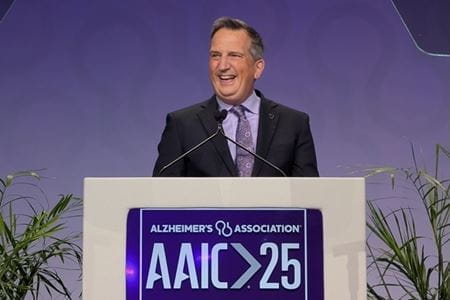The Alzheimer’s Association recognized two Indiana University School of Medicine Alzheimer’s experts during the largest international meeting for researchers, clinicians and dementia professionals worldwide. Bruce Lamb, PhD, and Donna Wilcock, PhD, received two of the six awards presented during the 2025 Alzheimer’s Association International Conference in Toronto July 27-31.
Along with their significant scientific contributions, both Lamb and Wilcock have volunteered as leaders within the Alzheimer’s Association. Lamb serves on the board of directors and is past chair of the association’s Medical and Scientific Advisory Group.
“Bruce Lamb’s excellence in the lab is exceeded only by his energy and dedication to supporting Alzheimer’s disease research in the community,” said Maria Carillo, PhD, chief science officer and medical affairs lead for the Alzheimer’s Association.
Wilcock has served on the International Society to Advance Alzheimer’s Research and Treatment (ISTAART) Advisory Council since 2016, including two years as chair, and is editor-in-chief of Alzheimer’s & Dementia: The Journal of the Alzheimer’s Association.
“Donna Wilcock exemplifies excellence as an investigator and leader in Alzheimer’s disease research,” Carillo said. “She is absolutely committed to the mentoring and advancement of junior scientists.”
Bruce Lamb: ‘Humble giant’ in Alzheimer’s disease research
Lamb developed an interest in Alzheimer’s disease as a postdoctoral fellow at Johns Hopkins University and “taught myself neuroscience.” Today he leads the Stark Neurosciences Research Institute at the IU School of Medicine, overseeing a team of more than 110 faculty investigators with a collective $89 million in funding from the National Institutes of Health.
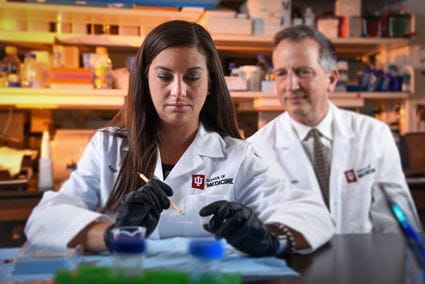
“What sets Bruce apart is his ability to lead large, complex research programs that bring together diverse teams and disciplines,” said Adrian Oblak, PhD, who serves as a co-principal investigator with Lamb on MODEL-AD, developing animal models for Alzheimer’s disease research. “He’s deeply respected not just at IU but across the field for his strategic vision and commitment to building the infrastructure Alzheimer’s disease research needs to move forward.”
At the conference, Lamb received the Zaven Khachaturian Award, which he also received from the Alzheimer’s Association in 2011 for organizing a 600-mile bicycle relay across the United States with Carillo that influenced passage of the Alzheimer’s Project Act, dramatically increasing federal funding for Alzheimer’s disease research.
“It was a moment in time in terms of starting to shift the trajectory,” Lamb said. “You go from about $400 million in federal research funding in 2010-2011 to now $3.8 billion this current fiscal year. It’s made a huge difference.”
Coming full circle, Lamb was chair of the Alzheimer’s Association Medical and Scientific Advisory Group when the first drug to slow the progression of Alzheimer’s disease was approved by the FDA in 2021.
“This is such an amazing time in Alzheimer’s disease research,” said Lamb, an IU Distinguished Professor and the Roberts Family Professor of Alzheimer’s Disease Research. “There’s a lot of activity and a lot of major advances, but there are also a lot of challenges in terms of getting the first therapeutics moving forward.”
That’s why Lamb recruited Wilcock in 2023 to lead the Center for Neurodegenerative Disorders at the IU School of Medicine-IU Health Neuroscience Institute. He said Wilcock has “hit the ground running” and built a brain health program that’s getting newly approved therapies to hundreds of Indiana Alzheimer’s disease patients.
Lamb is taking his own steps to accelerate Alzheimer’s disease drug development as cofounder of a biotech startup. Monument Biosciences has licensed nine drug targets discovered at IU in hopes of launching new therapies that can reverse neuroinflammation and restore key brain functions.
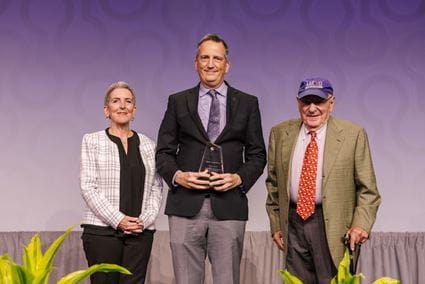
“Bruce’s work has helped position Indiana as a global hub for translational neuroscience,” said Monument Biosciences CEO Derek Small, also a cofounder. He calls Lamb “a humble giant in Alzheimer’s research” who combines visionary science with deep compassion for patients.
“His work continues to shape how we understand and treat neurodegeneration — always with a focus on real-world impact for patients and families,” Small said.
At IU, Lamb also co-leads the TREAT-AD Alzheimer’s disease drug discovery program and recently secured a new five-year, $16.5 million grant with Jason Meyer, PhD, to advance precision medicine in Alzheimer’s using human stem cells.
“We’ve really built a program that’s comprehensive in its nature with all these different aspects from basic science and discovery to blood biomarkers to clinical trials and drug therapies,” Lamb said. “It’s putting all those pieces together in one place that’s been unique and has helped us become one of the leading Alzheimer’s disease centers — and then made it easier to recruit leaders in the field.”
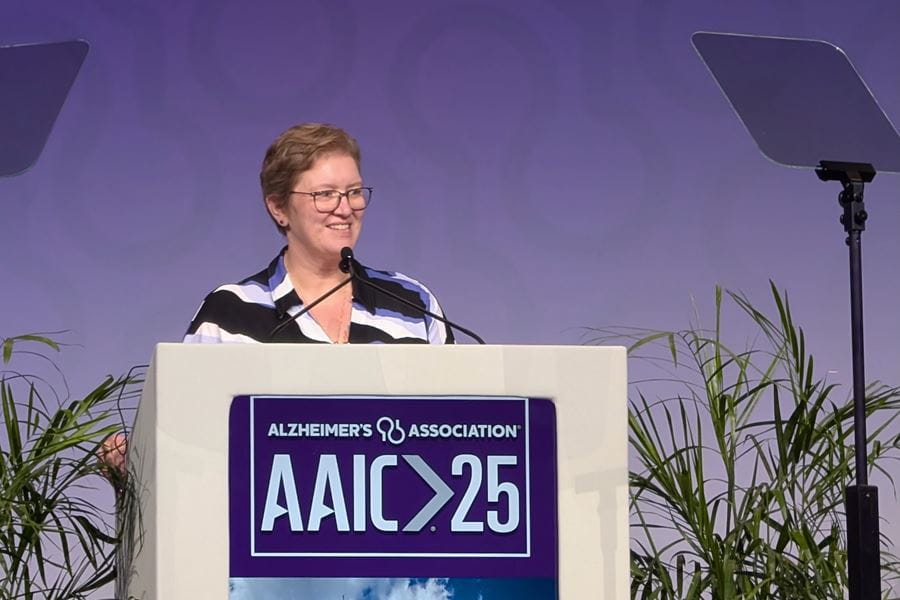
Donna Wilcock: Inspirational mentor in dementia science
A family history of epilepsy sparked Wilcock’s initial interest in neuroscience. As a first-generation student who grew up in an English coal-mining community, Wilcock earned her bachelor’s degree from Cardiff University in Wales before seizing an opportunity to study Alzheimer’s and Parkinson’s at the University of South Florida, where her PhD project focused on using antibodies to clear amyloid plaques from the brain.
Fast forward to today, and the foundational research that Wilcock and others were doing has led to the first FDA-approved therapies for Alzheimer’s disease, now being administered to IU Health patients through the Center for Neurodegenerative Disorders. Wilcock, the Barbara and Larry Sharpf Professor of Alzheimer’s Disease Research, has several NIH-funded research projects, including efforts to make Alzheimer’s disease treatments safer by exploring the cause of brain microbleeds and swelling that some patients experience with immunotherapy.
“Her focus on cerebrovascular pathology and key drivers of the adverse effect of immunotherapy in patients with Alzheimer’s disease is not only elegant work but will have a significant impact on how we may mitigate this outcome in the future,” said Elizabeth Head, PhD, a longtime research collaborator at the University of California, Irvine, who studies the connection between Alzheimer’s disease and Down syndrome with Wilcock.
Head recently spoke at the inaugural symposium for the IU Center for Neurodegenerative Disorders that Wilcock organized. The symposium included both scientific research and a community day where local people affected by Alzheimer’s disease could address a panel of experts. Other keynote speakers included Carillo and Malu Tansey, PhD, another recent IU recruit who directs the neuroimmunology research group at the Stark Neurosciences Research Institute.
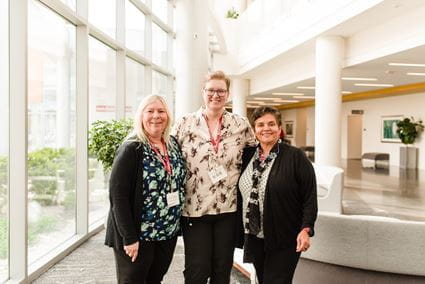
“Donna is respected and beloved in the vascular cognitive impairment and dementia (VCID) field and has chaired numerous symposia all over the world,” Tansey said. “Yet, she is one of the most humble humans I have ever met. She often works behind the scenes to get things done and support her colleagues.”
Kate Foley, PhD, is a postdoctoral fellow in Wilcock’s lab who relocated alongside Wilcock when she moved from the University of Kentucky to IU in July 2023.
“I basically would follow her anywhere,” said Foley, testifying to Wilcock’s engagement as a mentor. “I joined her lab with the goal of becoming an independent primary investigator, knowing that her mentorship would set me up for the best chance of success.”
At the conference, Wilcock received the Bill Theis Award for Distinguished Service to ISTAART, an award which recognizes her involvement in the Alzheimer’s Association’s professional development society and her dedication to mentoring the next generation of dementia scientists.
“She not only supports her own laboratory’s trainees at all levels, but she has supported my trainees and many other scholars both in the USA and internationally through mentoring activities,” Head said.
IU’s international impact in Alzheimer’s disease
Lamb and Wilcock were among dozens of IU faculty who presented a combined 148 learning sessions during the Alzheimer’s Association International Conference, along with two conference workshops and three exhibitions from IU School of Medicine’s internationally recognized research programs in Alzheimer’s disease.
IU is at the forefront of Alzheimer’s disease science, including research that recently led to the first FDA-cleared blood test for Alzheimer’s disease.
“Indiana University’s exceptional Alzheimer’s disease research programs are accelerating development of new potential drug targets and less invasive testing technology,” said Carrillo. “The Alzheimer’s Association looks forward to many more years of strengthening our partnership with the talented and dedicated team at IU as we work together to provide hope for nearly 7 million Americans living with this devastating disease.”
